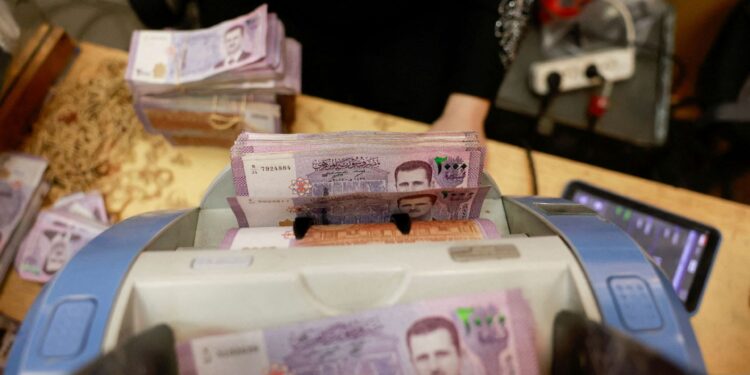The exchange rate of the Syrian pound against the dollar continued today, Monday, to rise in the parallel market in the day after a visit by President Ahmed Al -Sharaa to the Saudi capital, Riyadh, during which he met Crown Prince Mohammed bin Salman.
The Central Bank of Syria kept the prices unchanged.
The exchange rate of the Syrian lira today, Monday, in the parallel market
- The exchange rate of the Syrian pound in Damascus and Aleppo increased to 9 thousand pounds when purchasing from 9200 pounds registered yesterday evening, while the price when selling increased to 9100 pounds per dollar from 9300 pm yesterday.
- In Idlib, the exchange rate of the Syrian pound increased to 8900 pounds against the dollar from 9200 pounds registered yesterday evening when buying, while the sale price increased to 9 thousand pounds from 9300 pounds against the dollar yesterday evening.
- The exchange rate of the Syrian pound against the dollar in Al -Hasakah increased to 9250 pounds against the dollar from 9800 registered in the last trading yesterday, while the sale price increased to 9350 from 9900 pounds against the dollar registered yesterday evening.
The exchange rate of the Syrian lira at the Central Bank of Syria
The Central Bank of Syria remained the exchange rate of the Syrian pound at 13 thousand pounds for purchase and 13 thousand and 130 pounds upon sale, according to the official bulletin issued today, Monday.
Factors affected by the exchange rate of the Syrian pound
- Syrian President Ahmed Al -Shara visited a visit to the Saudi capital, Riyadh, during which he met Crown Prince Mohammed bin Salman and expressed a desire for economic cooperation with the Kingdom.
- The Turkish presidency said today, Monday, that Syrian President Ahmed Al -Shara will visit Ankara tomorrow, Tuesday, at the invitation of Turkish President Recep Tayyip Erdogan.
- The decisions of the new Syrian administration, which included the abolition of the 2012 constitution, and the dissolution of the Arab Socialist Baath Party, the People’s Assembly, the army, and the security services affiliated with the regime of the ousted President Bashar al -Assad.
- Last week, Syrian Finance Minister Mohamed Abazid discussed the possibility of easing the sanctions imposed on his country at his first meeting with European Union officials since the overthrow of Bashar al -Assad’s regime in December last year.
- The United States has reduced its sanctions on Syria, which opened the way for transactions with government institutions and energy transactions, and allowed the transfer of personal funds to the country, including through the central bank.
- Syrian banks do not pump the lira in the market, which prompts merchants and manufacturers to dispense with the dollar to obtain the lira from the parallel market to run their business.
- The supply of the US dollar increases, and the central bank holds precautions from the lira.
- Raising the customs tariff for import will motivate production and investment, support the local product, and limit the drain of the dollar.



